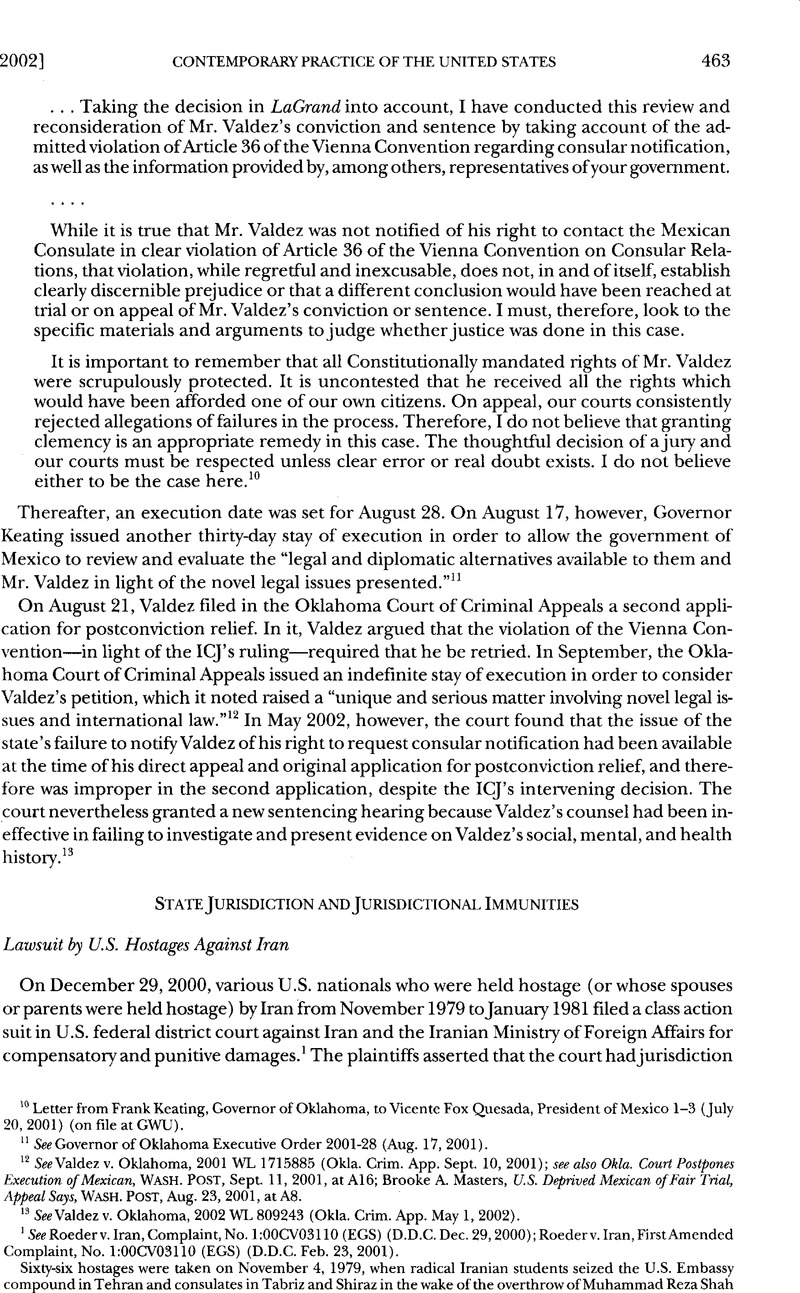No CrossRef data available.
Article contents
Lawsuit by U.S. Hostages Against Iran
Published online by Cambridge University Press: 10 March 2017
Abstract

- Type
- Contemporary Practice of the United States Relating to International Law
- Information
- Copyright
- Copyright © American Society of International Law 2002
References
1 See Roeder v. Iran, Complaint, No. 1:00CV03110 (EGS) (D.D.C. Dec. 29, 2000); Roeder v. Iran, First Amended Complaint, No. 1:00CV03110 (EGS) (D.D.C. Feb. 23, 2001).
Sixty-six hostages were taken on November 4, 1979, when radical Iranian students seized the U.S. Embassy compound in Tehran and consulates in Tabriz and Shiraz in the wake of the overthrow of Muhammad Reza Shah Pahlevi. Although thirteen hostages were released later that month and one was released the following July because of illness, the rest were held until January 20, 1981, the day that Ronald Reagan was sworn into office. Later in 1981, several of the hostages filed suit against Iran, but the cases were dismissed for lack of subject matter jurisdiction. At the time, the only arguably applicable exception to foreign sovereign immunity—the one for tortious acts—was found not to apply since that exception requires that the tort occur within U.S. territory. See Persinger v. Iran, 729 F.2d 835 (D.C. Cir. 1984); McKeel v.Iran, 722F.2d 582 (9th Cir. 1983); Ledgerwood v. Iran, 671 F.Supp. 311 (D.D.C. 1985).
Several former hostages also sued the United States on the ground that the extinguishment of the hostages’ right to sue Iran constituted a “taking” of private property without just compensation. The federal circuit court of appeals found that assuming (without deciding) that the hostages’ claims against Iran constituted “property” under the Fifth Amendment, the extinguishment of the claims was not a taking since (1) the Algiers Accords were primarily designed to benefit the hostages, (2) barring the hostage claims against Iran was not novel or unexpected, and (3) the president clearly had the authority to extinguish those claims in return for the hostages’ release. See Belk v. United States, 858 F.2d 706 (Fed. Cir. 1988).
None of the hostages filed cases before the Iran-U.S. Claims Tribunal in the Hague. See Aldrich, George H.. The Jurisprudence of The Iran-United States Claims Tribunal 105 (1996)Google Scholar.
2 See Tucker, Neely, U.S. Seeking to Vacate Judgment Against Iran, Wash. Post, Oct. 16, 2001 Google Scholar, at A2.
3 See, e.g., Rosen, Barry, With Iran, Against Americans, N.Y. Times, Dec. 12, 2001 Google Scholar, at A31.
4 Declaration of the Government of the Democratic and Popular Republic of Algeria, Jan. 19, 1981, para. 11, reprinted in 1 Iran-U.S. CI. Trib. Rep. 3 (1983); see also Declaration of the Government of the Democratic and Popular Republic of Algeria Concerning the Settlement of Claims by the Government of the United States of America and the Government of the Islamic Republic of Iran, Jan. 19,1981, Art. 11(1), reprinted in 1 Iran-U.S. CI. Trib. Rep. 9 (1983).
5 Exec. Order No. 12283 (1981), 46 Fed. Reg. 7927 (1981); 31 C.F.R. §535.216a (2000).
6 Pub. L. No. 104-132, §221 (a), 110 Stat. 1214, 1241 (1996), codified at 28 U.S.C. §1605(a) (7) (Supp. IV 1998).
7 28 U.S.C.A. §1605(a)(7) (West Supp. 2000).
8 See 49 Fed. Reg. 10,247 (1984).
9 Pub. L. No. 107-77, §626(c), 115 Stat. 748, 803 (2001). A subsequent technical correction was made to correct the initials in the case number from “ESG” to “EGS.” See Pub. L. No. 107-117, §208, 115 Stat. 2230, 2299 (2002). The initials are those of the judge in the case.
10 H.R. Conf. Rep. No. 107-278, at 170 (2001). In a hearing before the district court on December 13, 2001, Judge Emmet G. Sullivan asked “how can Congress quash a motion to vacate pending in an Article III court? What authority does Congress have to do that?” See Roeder v. Iran, Transcript of Morions Hearing Before the Honorable Emmet G. Sullivan, U.S. District Judge, No. 1:00CV03110 (EGS), at 10 (D.D.C. Dec. 13, 2001).
11 Statement on Signing the Departments of Commerce, Justice, and State, the Judiciary, and Related Agencies Appropriations Act, 2002, 37 Weekly Comp. Pres. Doc. 1723, 1724 (Nov. 28, 2001).
Separately, when adopting the technical correction cited supra note 9, Congress issued a joint Explanatory Statement of the Conference Committee, which described §626(c) as an “acknowledge [ment] that, notwithstanding any other authority, [plaintiffs] have a claim against Iran under the Antiterrorism Act of 1996.” H.R. Conf. Rep. No. 107-350, at 422-23 (2001). In signing that technical correction into law, however, the president stated that it
does nothing to alter the effect of that provision or any other provision of law. Since the enactment of subsection 626(c) and consistent with it, the executive branch has encouraged the courts to act, and will continue to encourage the courts to act, in a manner consistent with the obligations of the United States under the Algiers Accords that achieved the release of U.S. hostages in 1981.
Statement on Signing the Department of Defense and Emergency Supplemental Appropriations for Recovery from and Response to Terrorist Attacks on the United States Act, 2002, 38 Weekly Comp. Pres. Doc. 46, 48 (Jan. 10,2002).
12 Reply Memorandum in Support of the United States’ Motion to Vacate Default Judgment and Dismiss Plaintiffs’ Claims at 16-22, Roeder v. Iran, No. 1:00CV03110 (EGS) (D.D.C. Nov. 28, 2001) (footnotes omitted) [hereinafter U.S. Reply Memorandum].
13 Id. at 4-16.
14 Civil Liability for Acts of State Sponsored Terrorism, Pub. L. No. 104-208, §589, 110 Stat. 3009-172 (1996), codified at 28 U.S.C. §1605 note (commonly referred to as the “Flatow Amendment”).
15 U.S. Reply Memorandum, supra note 12, at 17-19.
16 Id. at 20, 23.
17 See Roeder v. Iran, 2002 WL 572100, at *16 (D.D.C. Apr. 18, 2002) (citing FSIA §1608(e)).
18 Id. at*17-19.
19 Id. at *19-20.
20 Id. at *21-23.
21 Id. at *23-24.
22 Id. at *23-37.
23 Id. at *37 (citation omitted).




